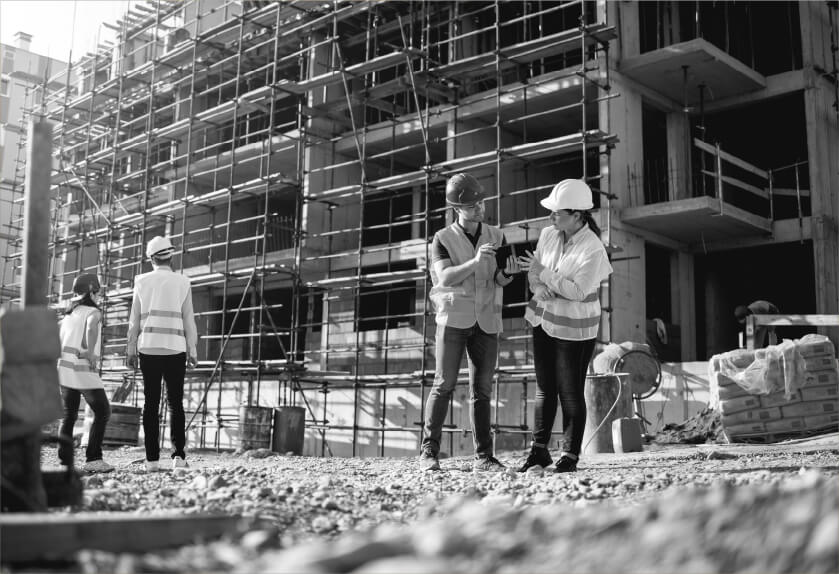We offer a variety of services to help resolve construction disputes, which cover a broad range of issues. For example, disputes can relate to contracts, payments or matters with the Queensland Building and Construction Commission (QBCC).
Contracts
Gibbs Wright regularly advises clients on disputes that arise between parties to a contract. Disputes and litigation can range from a minor disagreement about a contractual clause to protracted litigation.
We pride ourselves on getting good results for our clients, as quickly and as efficiently as possible.
We can help you with:
- understanding the contract and advising on terms as part of formulating an overall dispute resolution strategy that is efficient and cost-effective;
- residential contract disputes;
- dispute resolution clauses;
- dealing with defective work and delays;
- termination of a contract;
- negotiating commercial outcomes; and/or
- drafting and negotiating settlement deeds.
Contract interpretation and advice
We can assist you in identifying your rights and obligations under a particular contract and advise you accordingly. Regardless of whether you are a homeowner, a contractor or a principal, a comprehensive understanding of the contract will ensure that disputes can be avoided or resolved quickly.
Defective work and delays
The main questions in determining defects and/or delays deal with identifying:
- Who was supposed to do what?
- When was it required to be done?
- Did they do it in accordance with the standard that they agreed to?
Defects and delays can often be attributed (particularly in commercial contracts) to more than one party. Therefore, it is important to quickly determine liability for defects and delays.
We are associated with experts in the construction field who can prepare expert reports in relation to the above matters.
We can then advise in relation to the allowable causes for delay in the contract and a way forward, or on the appropriate strategy going forward to achieve the best outcome for you.
The main questions in determining defects and/or delays deal with identifying:
- Who was supposed to do what?
- When was it required to be done?
- Did they do it in accordance with the standard that they agreed to?
Defects and delays can often be attributed (particularly in commercial contracts) to more than one party. Therefore, it is important to quickly determine liability for defects and delays.
We are associated with experts in the construction field who can prepare expert reports in relation to the above matters.
We can then advise in relation to the allowable causes for delay in the contract and a way forward, or on the appropriate strategy going forward to achieve the best outcome for you.
Termination of contract
Most, if not all, commercial contracts have dispute resolution clauses which must be employed before an external claim can be made. In the case of residential contracts, the QBCC encourages parties to undertake early dispute resolution which helps the parties to communicate and avoid the dispute escalating.
Residential contracts generally require that the parties follow a strict process when considering a right to terminate the contract. In most cases, this will require the party to issue a notice to remedy breach before any termination can be purported.
To terminate a contract, it is imperative that you are on solid ground to do so. If the contract is terminated invalidly, you could be up for significant costs which could far outweigh any perceived benefit of terminating the contract.
Settlement deeds
A settlement deed is a document that formalises an agreement between parties in a dispute. It is sometimes called a “deed of release”, because the parties agree to release each other from all future claims and demands. It should clearly state details including who the parties are, a background to the dispute, key obligations, and consequences of non-compliance. Gibbs Wright can help you negotiate and draft a settlement deed that is both effective and enforceable.
Payments
Gibbs Wright regularly advises parties on payment matters arising from residential building work, including homeowners, contractors and subcontractors.
We can help you with:
- claims under the Building Industry Fairness (Security of Payment) Act 2017 (Qld) (the BIF Act);
- payment claims and schedules;
- late, short, and non-payments;
- subcontractor charges and timeframes; and
- subcontractor/supplier liens.
The Queensland Building and Construction Commission Act 1991 (Qld) (the QBCC Act) requires that all residential building work contracts entered into with a value over $3300 must be in writing and signed by all parties. Contracts over $20,000 must be in writing, signed by all parties and the building contractor must provide the building owner a copy of the consumer building guide.
Unless otherwise provided for in the contract, payments are made at the end of each stage. The stages are specifically defined in the contract and a builder must not demand payment for that stage until the work is completed. Typically, a dispute will arise when the completion of the stage is disputed by the homeowner after the builder has demanded payment for that stage, or the work is defective. If a homeowner withholds payment from a builder without a sufficient reason, the builder may suspend the work, charge interest or terminate the contract.
Accordingly, it is imperative parties understand their rights and obligations under the contract.
Claims under the BIF Act framework
Gibbs Wright regularly advises parties to all matters arising under the BIF Act (which replaced the Building and Construction Industry Payments Act 2004 (Qld), or BCIPA) and their interstate counterparts.
Our lawyers have advised clients on disputed claims ranging from $50,000 to more than $25 million.
We can help you with:
- understanding the legislative framework (including timing and technical issues) as part of formulating an overall dispute resolution strategy that is efficient and cost-effective; and
BIF Act timeframes for payment
There are strict time limits under the BIF Act, which must be complied with to ensure that a payment claim or payment schedule is valid. This is particularly important if a claimant makes an application for adjudication. If you do not comply with the timeframes, your interests will be compromised.
Subcontractor charges under the BIF Act
Gibbs Wright regularly advises contractors and principals who receive forms issued under the BIF Act.
The BIF Act provides a mechanism for subcontractors to secure payment from someone higher in the contractual chain.
We can help you with:
- drafting required forms;
- commencing or defending proceedings to enforce charges;
- negotiating commercial outcomes; and
- drafting and negotiating settlement deeds.
By issuing a valid subcontractor’s charge, the principal is required to withhold enough from any payment to the higher contractor to pay your charge. If the higher contractor doesn’t pay you then the principal pays you directly.
BIF Act timeframes for subcontractor charges
There are strict time limits under the BIF Act which must be complied with to ensure that the charge is valid and able to be enforced. If you do not comply with the timeframes, then your claim will fail.
The most important timeframes are:
- the claim must be made and submitted to the correct parties within three months of completing the work; and
- if you’re not paid, court proceedings need to be commenced within one month after the claim was made.
Subcontractor/supplier liens
If you have supplied building materials that have not yet been incorporated into the building work, you may be able to exercise a lien over the materials, if you have not been paid. To ensure that you can effectively assert a lien in such circumstances, it is important to address these matters in your contract.

















